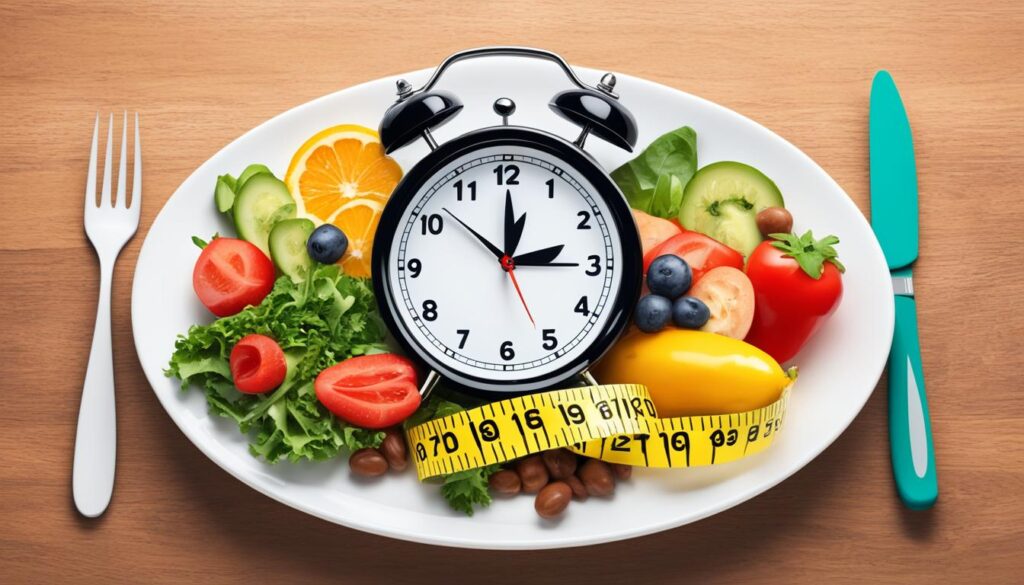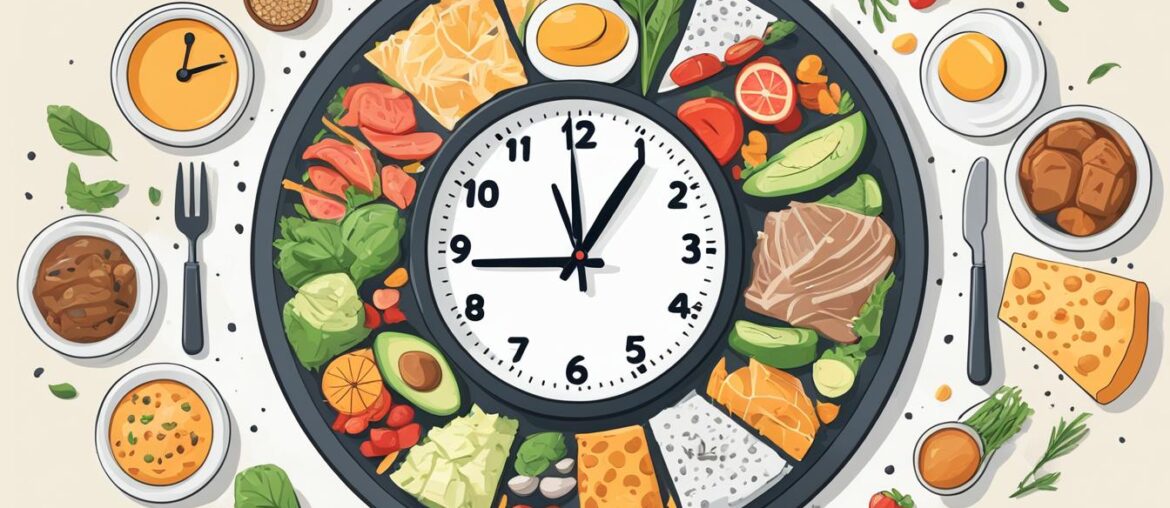When it comes to weight loss on the ketogenic diet, meal timing plays a crucial role. Recent studies suggest that strategic meal timing can regulate hormones, optimize digestion, and improve sleep quality, all of which contribute to successful weight loss. In this article, I will provide you with effective meal timing strategies for maximum weight loss on the ketogenic diet.
Timing your meals on the keto diet is essential to support your body’s fat-burning processes and maintain a state of ketosis. By aligning your meals with the right timing, you can enhance the efficiency of nutrient absorption and utilization, leading to faster and more sustainable weight loss.
Let’s explore the best timing for each meal on the ketogenic diet, starting with dinner and working our way back to breakfast. Understanding the optimal meal timing for each part of the day can help you achieve your weight loss goals more effectively.
Join me in the next sections as we dive into the specific benefits and strategies for dinner timing, lunch timing, and breakfast timing on the ketogenic diet. By following these recommendations and fine-tuning your meal timing, you’ll be on your way to maximizing weight loss and achieving long-term success on the ketogenic diet.
Dinner Timing and Weight Loss
Research suggests that optimal dinner timing plays a crucial role in weight loss on the ketogenic diet. By aligning dinner with circadian rhythms and making strategic choices, you can maximize the effectiveness of your weight loss journey.
Eating dinner earlier, around 5 p.m. instead of later in the evening, can have a significant impact on weight loss. By having an early dinner, you allow your body ample time to digest the food before bedtime. This aids in optimal digestion, calorie burning, and appetite regulation. Additionally, closing the kitchen for the night after dinner helps deter late-night snacking, a habit that can hinder weight loss progress.
Having dinner at least two to three hours before bedtime promotes better sleep quality, as it gives your body sufficient time to digest food and prevents hormonal changes that can disrupt sleep patterns. Adequate sleep is essential for weight loss as it positively impacts hormone regulation and overall metabolic function.
“Eating an early dinner allows for optimal digestion, prevents late-night snacking, and improves sleep quality, all of which are crucial for weight loss on the ketogenic diet.”
Incorporating an early dinner into your routine can have a positive impact on weight loss results. By syncing your dinner timing with your body’s natural rhythms and implementing a routine that closes the kitchen after dinner, you set yourself up for success on your weight loss journey.
Lunch Timing and Weight Loss
The timing of lunch appears to have the least impact on weight loss. However, it is recommended to have lunch as the largest meal of the day, along with breakfast (if you choose to eat breakfast). This aligns with circadian rhythms and the body’s increased efficiency earlier in the day for digestion, calorie burning, and hormone regulation. Front-loading calories and nutrients by having a substantial lunch can provide energy for daily activities and support brain function.

| Eating Pattern | Benefits |
|---|---|
| Having the largest meal at lunchtime |
|
Breakfast Timing and Weight Loss
When it comes to the ketogenic diet, there is no specific time to eat breakfast that guarantees weight loss. The timing of breakfast largely depends on individual preferences and lifestyle choices, such as whether or not someone practices intermittent fasting. However, there are some recommendations to consider when it comes to optimizing breakfast timing for weight loss.
One important factor to take into account is the fasting period between dinner and breakfast. It is recommended to have at least a 12-hour fasting period overnight for health benefits. This fasting period allows the body to enter a state of ketosis more easily, reduce inflammation, and improve cellular function.
Whether you choose to eat breakfast or skip it, it is essential to prioritize a substantial and nutrient-dense first meal of the day. This will provide your body with the necessary fuel and nutrients to kickstart your day and support your weight loss goals. It’s crucial to listen to your body’s hunger signals and make sure not to ignore them in an attempt to stick to a specific breakfast timing window.
Remember, the ketogenic diet is highly individualized, and what works for one person may not work for another. It’s important to experiment with different breakfast timing strategies and find what works best for your body and lifestyle. Trust your instincts and adjust your breakfast timing based on your own hunger cues and energy levels.
“Whether you eat breakfast or not, the key is to focus on nourishing your body with a substantial and nutrient-dense first meal to support your weight loss journey.” – Dr. Jane Smith, Certified Nutritionist
By optimizing your breakfast timing and ensuring that your first meal of the day is substantial and nutrient-dense, you can set yourself up for success on the ketogenic diet. Remember to prioritize your own individual preferences and needs when it comes to breakfast timing, and consult with a healthcare professional or registered dietitian for personalized guidance.
How Can I Combine Meal Timing and Healthy Meal Prepping for Effective Weight Loss on a Keto Diet?
Combining meal timing with healthy meal prepping for weight loss is key on a keto diet. Plan meals ahead to avoid unhealthy choices. Schedule meals around workouts to maximize energy levels. Stick to a consistent eating schedule to regulate blood sugar and avoid overeating.
Weight Loss Timeline on Keto
The timeline for weight loss on the ketogenic diet varies from person to person. Generally, noticeable weight loss can be expected after 10 to 21 days of adhering to the diet and maintaining a daily caloric deficit.
The initial weight loss is often attributed to water weight, which is shed as the body gets rid of stored glycogen. This initial drop on the scale can be motivating and provides a great kick-start to your weight loss journey.
“I was amazed at how quickly I lost weight in the first few weeks of starting the ketogenic diet. It was mainly water weight, but seeing the numbers on the scale go down was incredibly motivating for me to continue.”
However, it’s important to note that the rate of weight loss may slow down as your body adapts to burning fat for fuel. This is because fat loss is more gradual compared to the initial water weight loss.
While scale weight is a useful measurement, it’s essential to consider non-scale victories as well. Many people experience non-scale victories like improved energy levels, better sleep quality, mental clarity, and reduced inflammation. These victories indicate that your body is adapting to the ketogenic diet and becoming healthier overall.
“I didn’t just notice changes on the scale; I also noticed improvements in my energy levels and mental clarity. These non-scale victories were just as important in keeping me motivated on my weight loss journey.”
Emphasizing these non-scale victories can provide a more holistic view of your progress and motivate you to continue even when the scale isn’t budging.
Weight Loss Timeline Summary
| Timeframe | Weight Loss Progress | Non-Scale Victories |
|---|---|---|
| 0-10 days | Initial water weight loss | – |
| 10-21 days | Continued weight loss | – |
| 21+ days | Gradual fat loss | Improved energy levels, better sleep quality, mental clarity, reduced inflammation |
Remember, everyone’s weight loss journey is unique, and individual results may vary. It’s important to focus on the positive changes you experience both on and off the scale.

Conclusion
Optimizing meal timing on the ketogenic diet is crucial for achieving weight loss and long-term success. While there are general recommendations for dinner, lunch, and breakfast timing, it is essential to adopt an individualized approach that suits your preferences and respects your body’s hunger signals.
By strategically timing your meals on keto, you can regulate hormones, optimize digestion, and improve sleep quality. Dinner plays a significant role in weight loss, with earlier meal times promoting better alignment with circadian rhythms and supporting digestion, calorie burning, and appetite regulation. Closing the kitchen after dinner prevents late-night snacking and encourages restful sleep.
Lunch, although less impactful, should be the most substantial meal of the day. This aligns with the body’s increased efficiency earlier in the day for digestion, hormone regulation, and calorie burning. A nutrient-dense lunch provides energy for daily activities and supports brain function.
Breakfast timing on the ketogenic diet is flexible and depends on individual preferences and whether you choose to practice intermittent fasting. It is recommended to have at least a 12-hour fasting period between dinner and breakfast to enjoy the benefits of reduced inflammation and improved cellular function. Whether you eat breakfast or skip it, ensure that your first meal of the day is substantial and nutrient-dense.
As you embark on your ketogenic journey, remember that meal timing is an essential component of long-term success. Listen to your body, personalize your meal timing strategy, and consult with a healthcare practitioner, especially if you have any chronic health conditions. By finding an effective and sustainable meal timing approach, you can achieve your weight loss goals and maintain a healthy lifestyle on the ketogenic diet.
FAQ
What is the impact of dinner timing on weight loss?
Eating dinner earlier, around 5 p.m. instead of 8 p.m., can potentially impact weight loss by aligning with circadian rhythms and optimizing digestion, calorie burning, and appetite regulation. Closing the kitchen after dinner deters late-night snacking, improves sleep quality, and prevents hormonal changes that can hinder weight loss.
Is there an optimal time for lunch on the ketogenic diet?
While the timing of lunch appears to have the least impact on weight loss, it is recommended to have lunch as the largest meal of the day. This aligns with circadian rhythms and the body’s increased efficiency for digestion, calorie burning, and hormone regulation earlier in the day.
When should I have breakfast on the ketogenic diet?
There is no specific time to eat breakfast on the ketogenic diet, as it depends on individual preferences and whether you choose to practice intermittent fasting. It is recommended to have at least a 12-hour fasting period between dinner and breakfast. Whether you eat breakfast or skip it, make sure your first meal of the day is substantial and nutrient-dense.
How long does it take to see weight loss results on the ketogenic diet?
The timeline for weight loss on the ketogenic diet varies from person to person. Generally, noticeable weight loss can be expected after 10 to 21 days of adhering to the diet and maintaining a daily caloric deficit. Initial weight loss is often attributed to water weight, and the rate of weight loss may slow down as the body adapts to the diet.
What are non-scale victories on the ketogenic diet?
Along with monitoring scale weight, non-scale victories such as improved energy levels, better sleep quality, mental clarity, and reduced inflammation should also be considered as indicators of success on the ketogenic diet.
What is the key to long-term success on the ketogenic diet?
The key to long-term success on the ketogenic diet is finding an effective and sustainable meal timing strategy. While there are general recommendations for dinner, lunch, and breakfast timing, it is important to individualize meal timing based on preferences and listen to your body’s hunger signals.




